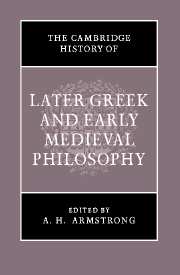Book contents
- Frontmatter
- Chapter 1 Introductory
- Part 1 GREEK PHILOSOPHY FROM PLATO TO PLOTINUS
- Part II PHILO AND THE BEGINNINGS OF CHRISTIAN THOUGHT
- Part III PLOTINUS
- Part IV THE LATER NEOPLATONISTS
- Part V MARIUS VICTORINUS AND AUGUSTINE
- Part VI THE GREEK CHRISTIAN PLATONIST TRADITION FROM THE CAPPADOCIANS TO MAXIMUS AND ERIUGENA
- Chapter 28 Introduction: Greek Christian Platonism
- Chapter 29 The Cappadocians
- Chapter 30 The pseudo-Dionysius
- Chapter 31 The reaction against Proclus
- Chapter 32 St Maximus the Confessor
- Chapter 33 The Philosophy of Icons
- Chapter 34 Johannes Scottus Eriugena
- Part VII WESTERN CHRISTIAN THOUGHT FROM BOETHIUS TO ANSELM
- Part VIII EARLY ISLAMIC PHILOSOPHY
- Select Bibliography
- Additional Notes and Bibliography
- Index of ancient and medieval works referred to in the text
- General Index
- Index of Greek terms
- References
Chapter 32 - St Maximus the Confessor
from Part VI - THE GREEK CHRISTIAN PLATONIST TRADITION FROM THE CAPPADOCIANS TO MAXIMUS AND ERIUGENA
Published online by Cambridge University Press: 28 March 2008
- Frontmatter
- Chapter 1 Introductory
- Part 1 GREEK PHILOSOPHY FROM PLATO TO PLOTINUS
- Part II PHILO AND THE BEGINNINGS OF CHRISTIAN THOUGHT
- Part III PLOTINUS
- Part IV THE LATER NEOPLATONISTS
- Part V MARIUS VICTORINUS AND AUGUSTINE
- Part VI THE GREEK CHRISTIAN PLATONIST TRADITION FROM THE CAPPADOCIANS TO MAXIMUS AND ERIUGENA
- Chapter 28 Introduction: Greek Christian Platonism
- Chapter 29 The Cappadocians
- Chapter 30 The pseudo-Dionysius
- Chapter 31 The reaction against Proclus
- Chapter 32 St Maximus the Confessor
- Chapter 33 The Philosophy of Icons
- Chapter 34 Johannes Scottus Eriugena
- Part VII WESTERN CHRISTIAN THOUGHT FROM BOETHIUS TO ANSELM
- Part VIII EARLY ISLAMIC PHILOSOPHY
- Select Bibliography
- Additional Notes and Bibliography
- Index of ancient and medieval works referred to in the text
- General Index
- Index of Greek terms
- References
Summary
Introduction
Born in Constantinople c. 580, Maximus was thirty when Stephen of Byzantium became director of studies at the Imperial Academy and taught, among other things, the philosophies of Plato and Aristotle; but whether he was educated there or at the Patriarchal Academy, he would have found already established the curriculum which Stephen inherited; for since the time of Leontius an Aristotelian renaissance had been underway, and the two philosophies were taught side by side. Leontius himself shows the effects of this programme, and they are to be seen again in Maximus.
Maximus, however, was closer in temperament to the Cappadocians and the ps.-Dionysius, and his achievement was to present doctrines that were basically theirs in terms of the Aristotelian logic which was more congenial to the intellectual temper of the time, and which, by rationalizing without rejecting their mysticism, rendered it less susceptible to misinterpretation. The universe of Maximus is that of the ps.-Dionysius with a place found in it for the anthropology of St Gregory of Nyssa. The rigid formularies of the one are quickened by the historicism and dynamism of the other, a synthesis made possible by the critical examination to which the philosophers who preceded them had subjected the Aristotelian theories of time and eternity, motion and rest.
It is still a triadic universe, but the triad upon which it is constructed is no longer defined in the Plotinian and Procline terms of monê—proodos—epistrophê, but as Being, Power, and Act (ουσια—δυναμις—ενεργεια). This terminology may be described as Porphyrian, since Porphyry is the first known to have referred to this triad, but Maximus is the first to explain it fully.
- Type
- Chapter
- Information
- Publisher: Cambridge University PressPrint publication year: 1967
References
- 1
- Cited by



